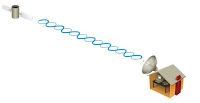DHCP Overview
As the name suggests this protocol is used to dynamically assign the IP address, DNS, Default gateway and other intended parameters to the requesting client.
DHCP Servers are configured with scope or pool of IP addresses. We can set up IP exclusions for ip addresses which we do not want to be scoped or assigned dynamically. MAC based reservations are also possible which reserve an IP address to a particular machine even when it gets assigned dynamically. Other attributes like DNS, Default gateway can be included in the DHCP messages under OPTIONS. Default gateway as Option 3. DNS server is included as Option 6, Lease time as to how long a machine can use the IP address assigned under Option 51
The client sends an initial broadcasts in the network in the form of a Discovery message requesting for its IP addresses and other details.
The DHCP server in the network responds to the client by sending an Offer message. The Offer message contains the IP address along with other required details from the DHCP pool created in the DHCP server.
The client receives the new IP address along with Options and responds back by sending the Request message via the newly allotted IP address.
The DHCP server sends a final Acknowledgement confirming the allocation of IP address.
In case DHCP servers are not located in the same broadcast domain, the L3 devices can be configured for ip helper address or ip dhcp relay to respond to the DHCP Discover messages and get them routed over the network to the destined DHCP servers. DHCP servers respond back to routers which in turn sends the message back to the client. In the diagram above in case the DHCP server on the LAN doesn't exist and there is only one DHCP server (named DHCP server 2) by using ip helper address or ip dhcp relay on the L3 routers the Discover messages can be relayed from Client to the DHCP Server 2.



Comments
Post a Comment